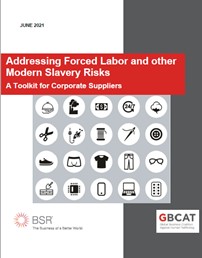Counter-trafficking Regional and Global Statistics at a glance
GuidanceStandards & Codes of ConductGood PracticesGraphics & InfographicsThis report provides statistics and minor analysis regarding the demographics of those trafficked in 2015.
This toolkit aims to help businesses in corporate supply chains quickly identify areas of their business which carry the highest risk of modern slavery and develop a simple plan to prevent and address any identified risks.
Businesses operating in global supply chains are more likely to encounter situations of modern slavery— the exploitation of people for personal or commercial gain—than their multinational counterparts, yet many lack simple guidance on how to identify, prevent and manage these risks effectively. This toolkit is specifically designed for human resources, procurement, and management teams within businesses in corporate supply chains (“corporate suppliers”) who are tasked with ensuring their organizations operate responsibly, including with respect for human rights.
Businesses will benefit from this guidance particularly if they:
• Employ migrant or temporary labor, or work with business partners that do.
• Seek to attract or retain global client companies.
• Aim to reduce of fines and business interruptions associated with modern slavery.
This toolkit uses the term “modern slavery” to describe a range practices that may be encountered by a supplier, including forced labor, labor trafficking, sex trafficking, and child labor. While child labor is discussed, more emphasis has been placed on the risks associated with forced labor, labor trafficking, and sex trafficking. This toolkit does not intend to be a comprehensive resource for suppliers on modern slavery. Rather, it is designed to point suppliers to high-risk areas where modern slavery may take place for a quick assessment and suggest additional comprehensive resources that will enable suppliers to better understand and address any identified impacts. The risks flagged and remediation actions offered are focused specifically on the impacts of modern slavery, and do not replace a human rights due diligence process, which is called for under the UN Guiding Principles on Business and Human Rights.
This resource was written by Shubha Chandra, Sara Enright, and Alice Pease of the Global Business Coalition Against Human Trafficking (GBCAT), a BSR Collaborative Initiative. It was developed with support from the ILO Global Business Network on Forced Labour, and input from a range of stakeholders. Its recommendations are based on desktop research as well as consultations with advisors and corporate members of GBCAT and their key suppliers.

This report provides statistics and minor analysis regarding the demographics of those trafficked in 2015.
The handbook is the result of years of cooperation between Frontex, border guards, non-governmental agencies and international organisations such as United Nations High Commissioner for Refugees (UNHCR) and International Organization for Migration (...Read More
An overview of the risks to migrant workers on construction projects across the Gulf. Migrant workers make up between 60% and 90% of the workforce in the six countries of the Gulf Cooperation Council (GCC). Low-wage construction workers are at parti...Read More
During the current global health crisis, labour recruiters play an essential role in protecting migrant workers and ensuring essential services have the staff they need to provide elevated levels of care. Recruitment agencies are also on the frontli...Read More